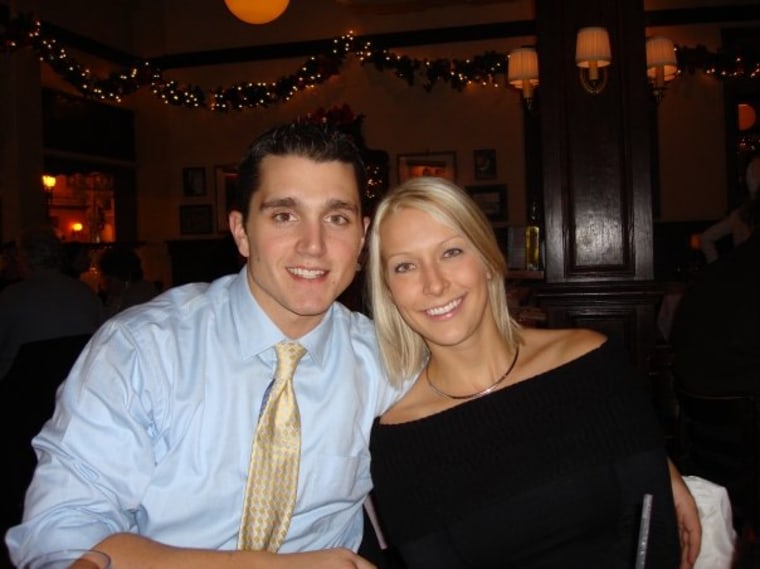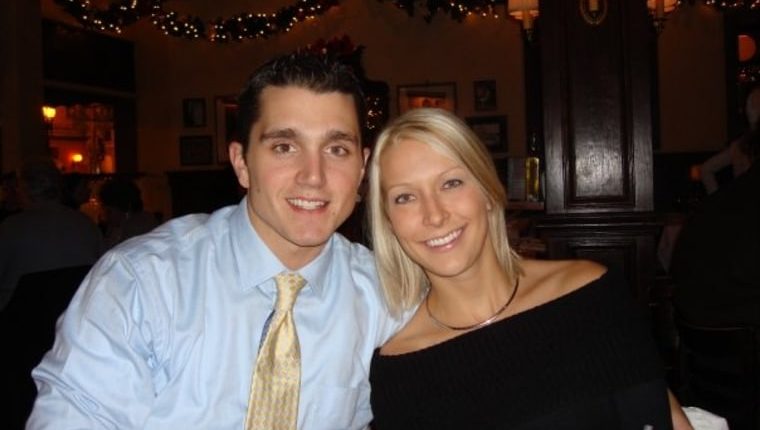Becky Bliefnick was discovered dead in her Illinois home one afternoon earlier this year. Her bedroom door had been kicked open, and the nurse and mother of three was on the bathroom floor. She’d been shot 14 times.
Her husband, a star college football player and well-known local salesman who once appeared on “Family Feud” and described saying “I do” as the biggest mistake someone could make at their wedding, was convicted of her murder in May.
In August, Tim Bliefnick, 40, was sentenced to life in prison for the Feb. 23 killing in Quincy, a city of roughly 40,000 near the Missouri state line.
But in interviews with NBC News and “Dateline,” experts, Becky’s relatives and prosecutors pointed to a lingering issue: In the years before her killing, she had sought an emergency restraining order against her husband, saying she needed protection from abuse and harassment.
For more on Becky Bliefnick’s death, tune in to “Ghost Rider” on Dateline at 10 ET/9 CT tonight.
But the petition was denied — a move Becky’s sister, Sarah Reilly, attributed to what she described as bias within the legal system. Because Becky and Tim were getting divorced — and because he’d filed his own restraining order against his wife, which was also denied — Reilly believes the court viewed her application as gamesmanship.
And because much of the alleged abuse was psychological, Reilly told “Dateline,” Becky wasn’t taken seriously.
“Nobody believed her because you can’t see emotional abuse,” Reilly said. “You can’t see what happens behind closed doors. You can’t see manipulation.”
“Judges are in a tough position,” Josh Jones, an assistant state’s attorney in Adams County who prosecuted Becky’s case, told “Dateline.” “I don’t want to say that it’s the wrong thing to do, but it’s a failing of the system that we don’t treat emotional trauma and we don’t treat verbal trauma the same way we do physical trauma,” he said.

Laura Keck, another prosecutor in the case who specializes in sex crimes, added that in her experience, emergency protection orders — which are temporary and issued immediately — are “virtually impossible” to obtain if requested during a heated divorce.
In an Oct. 22, 2021, order, Eighth Circuit Court Judge Robert Adrian did not say why he refused to grant the Bliefnicks’ requests, and he did not respond to an interview request.
More ‘Dateline’ cases
A lawyer for Tim, who has claimed innocence in his wife’s murder and is appealing his conviction, said there was no credible evidence that her client was abusive. Their disputes were typical of married couples, the lawyer, Casey Schnack, told “Dateline,” though “they both probably said things they shouldn’t have said during the divorce.”
The lawyer added that requesting a protection order is “very common game play” among divorcees in Adams County, especially when a judge has not issued rules for parenting and other matters, as was the case with the Bliefnicks.
“The easiest thing to do is to go run to a judge and ask for an emergency order,” Schnack said.
‘Manipulation and control’
Tim and Becky married in 2009, but by the time Tim filed a petition for a protection order on Sept. 1, 2021, they were separated and he’d filed for divorce.
In the petition, he accused Becky of repeatedly calling him and demanding to speak to their youngest son; of becoming combative at their children’s school after he declined to give her a letter that one of their sons had written to them; and of harassing him via text to find out where he was with their children.
Becky filed her own petition a month later, accusing Tim of repeatedly entering her home without permission and using their children to access the house and take things. When she called police over one of the incidents, Becky wrote in the petition, responding officers told her that she needed a restraining order to prevent similar situations.
According to the petition, Becky also accused Tim of cutting down her favorite tree as punishment for “not doing things he’s been asking for for 10 years;” of threatening to toss out a family pet — Becky was an animal lover — because she wasn’t adhering to a strict workout regime; and nearly hitting her and one of their children with a garden hose and reel during an argument.
When Becky told Tim she didn’t feel safe around him and wanted to sleep with one of their children, she wrote, he threw her bedding into the basement.
“His form of torture really was manipulation and control,” Reilly said.

That September, the month before Becky asked for a restraining order, she texted her sister an ominous message. “She said that she was fearful of Tim,” Reilly recalled, adding that Becky had recently learned of a colleague who had been killed by an estranged partner.
“This was the first time it really registered with her that she or her children could be in danger,” Reilly said.
Beyond physical violence
Vickie Smith, CEO and president of the Illinois Coalition Against Domestic Violence, said that allegations of Tim entering Becky’s home without permission should have been a red flag for the court.
“Just think about it in the context of anybody’s life,” said Smith, who was aware of Becky’s case but unfamiliar with the details. “If anyone who does not live in your house is continually coming into your house and taking your belongings, how are you gonna feel? These are very particular behaviors meant to terrify another person.”
To outside observers, those actions may seem innocuous, she said, but they can be part of a slow, steady acceleration of some of the most common behaviors in abusive relationships — coercion and manipulation, isolation and control.
“There’s this assumption that when we say ‘domestic violence,’ that it’s physical violence,” Smith said. “Most of the time it’s not.”
Yet in divorce and family courts, she said, judges continue to doubt allegations of abuse that are long term, emotional or financial — and they don’t believe that abuse could “potentially become dangerous very quickly,” she said. That doubt can be compounded by a myth that people who request an order do so to gain tactical advantage in a divorce proceeding, she said.
“Lawyers have set this up and view those orders in that way,” Smith said. “People who want or need orders for protection — and unfortunately [Becky’s] death proves what we’re talking about — don’t run to court and ask for an order. They have to be able to state what has happened to them and they’re afraid of what will happen to them.”
“People talk about them as if they’re handed out like candy,” she said. “Well, no, they’re not.”
Unlike lawyers in Illinois, Smith said, the state does not require judges to participate in continuing education. In her view, she said, many judges likely have outdated views of domestic violence.
Many, for example, still routinely refuse to issue protection orders if a threat is made through social media or text messages, she said.
“We just have a long way to go before the courts and law enforcement and society in general are really informed about what abusers do,” she said.
World was crashing down
Roughly two months after Becky’s petition for a protection order was denied, she filed another, this time aimed at her father-in-law. Some of her husband’s relatives had accused her father-in-law of sexual assault, she wrote in the petition, and she didn’t want him near their children.
According to the petition, after she confronted Tim about the allegations, he told her to “calm down” and not to worry because their children were boys, unlike the relatives who claimed they’d been assaulted.
“I was beside myself,” she wrote. “I could not believe that my children’s own father was unwilling to take extra precautions to protect our children from potential abuse.”
“Tim threatened me that if I ‘outed’ his father for what he has done, that his dad would probably have to move away and his dad would probably kill himself and it would be my fault,” she wrote.
In an amendment to the petition, Becky named several relatives and described the alleged abuse. Two were minors at the time of the incidents, according to the document. A third was 22 years old. Becky also identified a fourth relative who reported witnessing some of the alleged abuse.
In a motion to dismiss the petition, a lawyer for the father-in-law described the allegations as hearsay unsupported by affidavits or testimonials. And he accused Becky of abusing the state’s domestic violence laws with a public record aimed at destroying his reputation and labeling him as “one of the most despicable types of individuals in our society today.”
The lawyer, Nicholas Rober, told “Dateline” that his client “unequivocally denies” the allegations.
The relatives never reported the abuse to authorities and the father-in-law has not been charged with a crime.
Schnack, Tim’s lawyer, said that Becky had heard stories about the allegations for years and they had not become an issue “until the divorce got hot and heavy.”
A judge dismissed Becky’s petition two months after she filed it, but the allegations were shifted to the divorce proceedings, Schnack said. And by early 2023, some of the relatives named in the petition were expected to appear at a court hearing to testify about the alleged abuse, she said.
Then, on Feb. 23 — days before the hearing — Becky was fatally shot inside her home.
At Tim’s criminal trial, prosecutors portrayed the hearing — where the judge would also determine custody issues — as a key part of the motive in Becky’s killing.
“Tim’s world was going to come crashing down in his mind,” Jones, the assistant state attorney, told “Dateline.”
Schnack dismissed the prosecutors’ theory, saying they had a great story that was unsupported by proof.
“He wasn’t that angry,” she said of Tim, adding: “They had both moved on.”
On Aug. 11, three months after a jury found Tim guilty of first-degree murder, a judge sentenced him to life in prison and said: “Mr. Bliefnick, you researched this murder, you planned this murder, you practiced this murder. You broke into her house and you shot her one, two, three, four, five, six, seven, eight, nine, 10, 11, 12, 13, 14 times.”
Source: | This article originally belongs to Nbcnews.com










